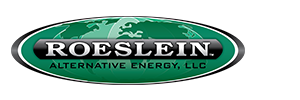Published by Biomass Magazine
Written by Anna Simet
Construction of phase one of Roeslein Alternative Energy’s $80 million anaerobic digestion project is about halfway complete and on schedule to be operational by the middle of next year, the company reported.
Work at the site, Smithfield Foods hog finishing farms in northern Missouri, began in August 2014. The project, which Roeslein believes is the largest livestock manure-to-energy project of its kind, involves nine Smithfield Foods Missouri hog production facilities, and the waste from nearly two million pigs.
Phase one of the project, now half done, has involved the installation of impermeable covers and flare systems on 88 existing manure lagoons, work being done by Industrial & Environmental Concepts Inc. The next phase will involve fabricating and installing a biogas purification system, and interconnection to a natural gas pipeline network operated by ANR.
RAE projects the project to be pushing gas into the pipeline by next summer. North Carolina utility Duke Energy has agreed to purchase a portion of the RNG, according to the company, which estimates the manure to produce approximately 2.2 billion cubic feet of pipeline quality RNG, or the equivalent of 17 million gallons of diesel fuel annually.
The project is providing $120 million in new work for Missouri supply chain, manufacturing, and construction companies and their employees, RAE said.
RAE has indicated since the project was announced that it intends to codigest biomass from restored prairie grasslands, along with the hog manure, to generate more RNG. The company has dubbed the initiative “Horizen Two,” and said its intent is to provide an economic incentive to convert highly erodible or marginal land, currently used for commercial agriculture production, to environmentally beneficial prairie. “We are developing a mixture of grasses and native species that provide ecological services, wildlife habitat and biomass that will be codigested with manure,” said RAE President Rudi Roeslein. “We hope to demonstrate the concept on a small scale at Ruckman, move it to other farms and then hopefully across the Midwest.”

